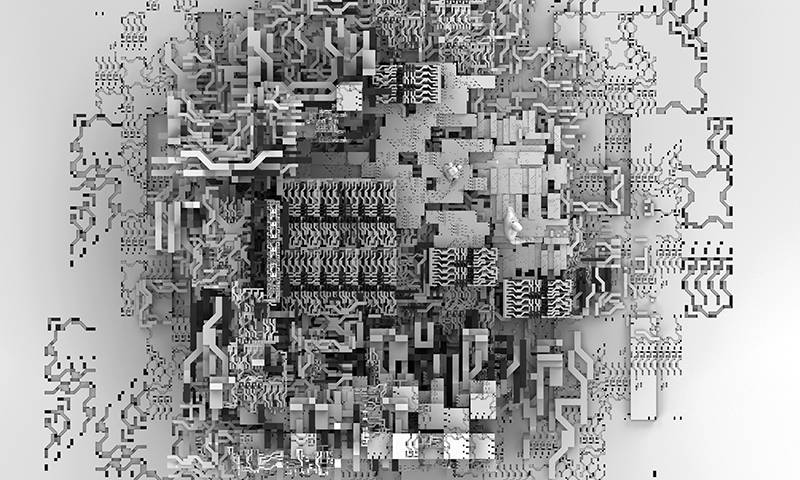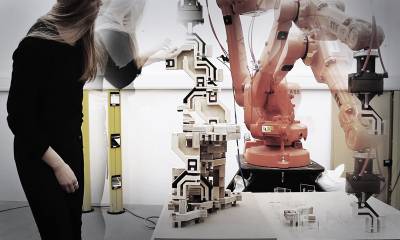A research-led Master's degree exploring the history, theory and criticism of computational design and fabrication
 About
About

One of the school's B-Pro programmes, this programme explores digital theory, history and culture in relation to architecture and is led by world-renowned innovators in the field.
Conceived as a research laboratory, this programme offers a hybrid pedagogical format where learning and experiments, inspired by today’s evolving design technologies, are conversant with the culture of the design community, and informed by recent scholarship in the arts and humanities. The core of the programme is a year-long research project, where students develop an individual topic of their choosing within the broad areas of interest outlined below.
Students’ projects will be mentored by the programme’s tutors and by invited lecturers through individual tutorship and systematic teaching. Students will be encouraged to pursue a curatorial or research topic leading to an actual exhibition and/or publication.
Additionally, students will follow at least one lecture course on digital history and theory specific to this programme, as well as two courses chosen among modules currently taught in other Master’s programmes at The Bartlett, either in the design or in the technology fields. Applicants are advised that this history and theory programme does not include studio-based design classes.
Highlights
- Develop an advanced knowledge of digital theory and architecture with leading academics and practitioners
- Be mentored throughout the year by an academic with expertise in your chosen area of research
- Bolster your research expertise with taught modules from other Master's programmes at The Bartlett, as well the school's rich schedule of seminars and lectures.
Modules
- Core modules
- History and Theory of Digital Design
- Architecture and Digital Theory: mini research project
- Architecture and Digital Theory: main research project
- Optional modules
Students choose two of the following:
- Design as a Knowledge-Based Process
- Introduction to Programming for Architecture and Design
- Architectural Design: Historical, Cultural and Theoretical Skills
- Areas of interest – potential research topics
Specific research topics could be developed within the following areas of interests:
- Digital design and fabrication: notational languages and design-to-production integration, from spline modelers to discretization. History and criticism of design and fabrication software and of digital styles: from parametricism to computation. Designing with Big Data and the challenge of complexity: generative, agent-based design and cellular automata. Image theory and theories of digital replications. From pixel to voxel: 3D scanning, 3D printing and voxelization. “New materiality” and structural design: granularity, variable properties materials, bio-technologies. From Finite Element Analysis to the "new science" of simulation and optimization.
- From machine to body: the new body-machine interfaces and prosthetic apparata; scanning, sensing, virtual and augmented reality, immersive and interactive environments, from wearables to the domestic, urban and territorial scales.
- From bodies to collective intelligence: datascapes, real-time mapping, GIS and socio-political geography, landscapes and biotech control, space syntax and technologies of simulation for urbanism and planning. Geospatial cyberinfrastructure.
- Cognitive aspects of design computing systems. Intelligent Support in Design and in the Built Environment.
- The new political economy of digitally driven environments: from non-linearity and Object Oriented Ontology to the new markets, pricing, and business models of digital granularity. Multi-Modal Applications and Data Analysis.
- History of digital tools for notation and fabrication, from manual to mechanical to electrical to electronic; from Alberti's geometrical and number-based replication machines to early CAD-CAM in the 20th century. History of quantification in design and of design processes as cultural technologies: geometry and projections, numeracy and the rise of formalization in early modern architectural theory. The modern analytic approach to structural design, from Galileo to F.E.A.
Key information
Modes/duration
Full-time: one year
Part-time: two years
Flexible: three to five years
Entry requirements
The typical minimum qualifications for this programme are an upper second-class undergraduate degree in architecture or an associated discipline from a UK university or an overseas qualification of an equivalent standard.
This programme may be of interest to students oriented towards a career in the design professions with an undergraduate degree in architecture, with a particular theoretical interest in digital design and fabrication or candidates with an undergraduate degree in disciplines outside architecture.
Application guidance for 2023 entry
Applicants can only apply for a maximum of two postgraduate degree programmes at The Bartlett School of Architecture.
Application deadline
Applications for 2023 entry will open on 17 October 2022 and close on 30 June 2023.
We strongly advise early application, as our programmes are over subscribed and competition is high.
Deferral
It is not possible to defer an offer at The Bartlett School of Architecture. If you wish to be considered for the following year then you must reapply in the next admissions cycle.
Tier 4 Student visa holders
Tier 4 Student visa holders are required to meet the English language proficiency of their offer with sufficient time to allow them to obtain a CAS number and visa.
Accepting your offer
To accept your offer, you must pay the non-refundable fee deposit and decline any other offers for programmes at The Bartlett School of Architecture. If you do not respond within the given time indicated on your UCL offer letter, then your offer will be withdrawn.
Fees and funding
- Tuition fee information can be found on the UCL Graduate Prospectus.
- For a comprehensive list of the funding opportunities available at UCL, including funding relevant to your nationality, please visit the Scholarships and Funding section of the UCL website.
- Further information about the programme
Digital tools for design and fabrication are inspiring contemporary architecture, reshaping the global building and construction industry, and upending the definition and roles of the design professions as we have known them in the West since the Renaissance. Now almost twenty years in the making, the digital turn in architecture can already be seen as a watershed in the history of building technologies, as important as stereotomy was in the Middle Ages, iron in the 19th century, or reinforced concrete in the 20th.
Since the early 1990s, architecture schools have been at the forefront of digital innovation, and many ideas and technologies that were originally born or developed in design studios have already become mainstream, and are prompting and and driving global trends. For example, digital mass-customisation and distributed 3D printing, of which the theory and practice can be traced back to architectural schools, are now being discussed by leading business schools around the world.
Politicians and decision-makers who are studying the global implications of digital technologies often refer to the pioneering work of a handful of architects and architectural critics, and critical categories that were first introduced and developed by the architectural avant-garde have been largely adopted by industrialists, sociologists and philosophers trying to come to terms with the new paradigms of a post-mechanical society.
The Bartlett has played an important role in the history of the digital turn in architecture. It is one of the leading global hubs for innovation in digital design and fabrication, and students on this MRes programme will be able to profit and draw from The Bartlett’s outstanding resources in the field, both human and technical.
Staff
- Professor Frédéric Migayrou, Programme Director
Frédéric Migayrou is Chair, Bartlett Professor of Architecture at The Bartlett School of Architecture and Deputy Director of the Musée National d'Art Moderne, Centre de Création Industrielle at the Centre Pompidou Paris. He was the founder of the Frac Center Collection and of ArchiLab, the international festival of Prospective Architecture in Orléans.
Aside from recent publications and exhibitions (such as Le Corbusier, Centre Pompidou 2015), he was the curator of Non Standard Architectures at the Centre Pompidou in 2003, the first exposition devoted to architecture, computation and fabrication. In 2012 he founded B-Pro, a suite of postgraduate architecture and computation programmes at The Bartlett.
- Professor Mario Carpo, Programme Director
Mario Carpo is the Reyner Banham Professor of Architectural History and Theory at The Bartlett and Co-Director of the Programme Architecture & Digital Theory MRes.
His area of specialisation is the history of architectural theory and cultural technologies, with a focus on the early modern period (the Vitruvian tradition and the Italian Renaissance, from Alberti to Vignola) and on contemporary digital design theory (1990 to the present).
- Bill Hodgson, Departmental Tutor
Careers
The Bartlett School of Architecture is one of the world's top-ranked architecture schools and our graduates enjoy excellent employment opportunities and the potential to carry out future doctoral research in the field.
Contact
Programme Director: Mario Carpo and Frederic Miayrou
Departmental Tutor: Bill Hodgson
Postgraduate Admissions: Mario Carpo
Programme Administrator: Tom Mole and Tung Ying (Crystal) Chow
Programme admissions enquiries: Complete the contact form
Lead image: 'CSD' - multiscale articulation of a void by Oliver Ledzema Gallegos and Ian Tu, 2016-17
 Close
Close


